How Havana became a celebrity magnet - again
- Published
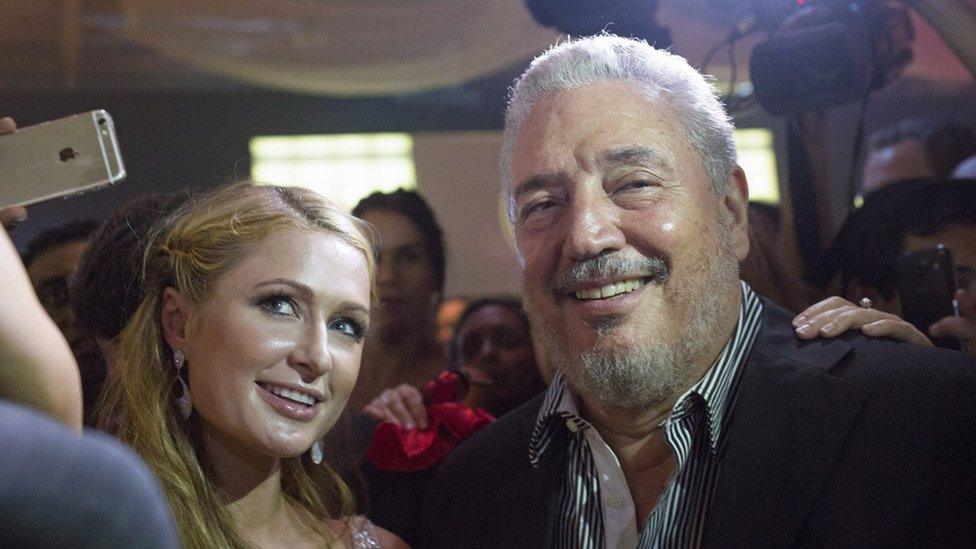
Paris Hilton and 'Fidelito' Castro Diaz-Balart
At the gala dinner at last year's Havana cigar festival, Paris Hilton got up from her table and shimmied across the room to take a "selfie" with Fidel Castro's eldest son, "Fidelito" Castro Diaz-Balart.
It made an arresting image.
Immediately after taking power in January 1959, Fidel Castro commandeered a hotel owned by Paris Hilton's great-grandfather, Conrad Hilton.
He installed the revolution's headquarters at the Hilton hotel for several months before nationalising it and renaming it the Habana Libre.
But while her great-grandfather might not have approved, the self-styled "celebutante" seemed to have no axe to grind with Cuba.
Later, she posted on social media a snap of herself outside the Habana Libre.
Punching above its weight
And she is far from the only celebrity to have come to the island this past year.
"Matt Dillon, Alex Gibney, Annie Leibovitz, Rihanna, Hanif Kureshi, Ethan Hawke, Helen Hunt, Don Cheadle," Havana-based film producer Rosa Bosch lists just a few of the people she has worked with or hosted in Cuba since the rapprochement with the United States in December 2014.
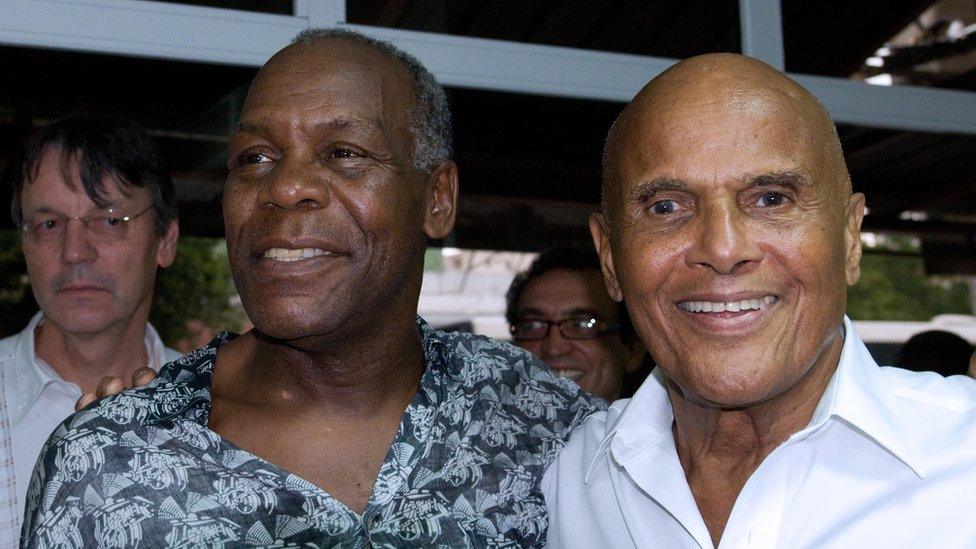
Actors like Danny Glover (left) and Harry Belafonte, seen here, have been travelling to Cuba for decades
But as someone who has worked in Cuba since the 1980s, she says the idea that the country was hermetically sealed is wrong and that high-profile visitors to Havana are nothing new.
"Cuba is an island that punches above its weight - especially in culture, history, education," says Ms Bosch.
"And that's largely thanks to the revolution."
Business plans
"There has always been a large number of intellectuals and artists coming in, from Simone de Beauvoir and Jean-Paul Sartre meeting Fidel Castro to Truman Capote and all the big American writers coming here before the revolution."
Why the US is looking beyond dissidents in Cuba
Young Cubans' hopes for their country
The key difference now, Ms Bosch says, is people are no longer coming under the "solidarity umbrella" like Harry Belafonte or Robert Redford in the 1990s.
Rather, many artists are bringing plans of establishing joint ventures when they get here.
"I think it goes in waves," she says.
"We've had a lot of prominent people coming as tourists.
"What we haven't seen yet is whether there will be more chances to have a consolidation of collaborative events.
"The one thing you should know about Havana is you lift a stone and there is talent underneath."
Art appeal
Last year, joint US-Cuba projects were held in everything from classical music to basketball.
But the biggest cultural event of 2015 was the Havana Biennial art exhibition.
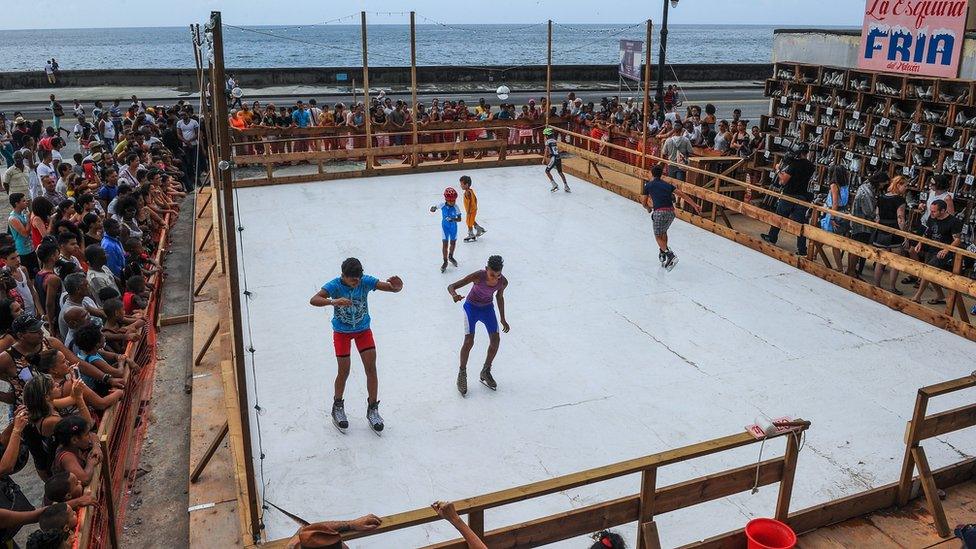
An ice rink was erected on the Malecon made for the Havana Biennial art exhibition
One man who has been instrumental in bringing artists from both countries together is Alberto Magnan, the co-director of the Magnan Metz Gallery in New York.
He brought six American artists to the exhibition.
And, as a Cuban-American, he readily admits trying to back US President Barack Obama's diplomatic push by promoting bilateral projects in the arts.
"Obama has opened things up," Mr Magnan says during one of his regular visits to the island of his birth.
"The fact is that it is now very easy for folks to come to Cuba for a range of cultural events.
"Last year, I think around 600 private jets landed in Cuba.
"I think you'll be seeing double or triple that amount soon, as well as the yachts.
"The art collectors who come here for the first time, well, that's fine.
"But it's the collectors who are coming back again and want to invest in Cuba's future that I'm interested in bringing out now."
Alarm bells
The idea of scores of private jets in Havana's airport and American yachts moored at the Hemingway Marina might set off alarm bells among some of the older generation of revolutionaries in Cuba.
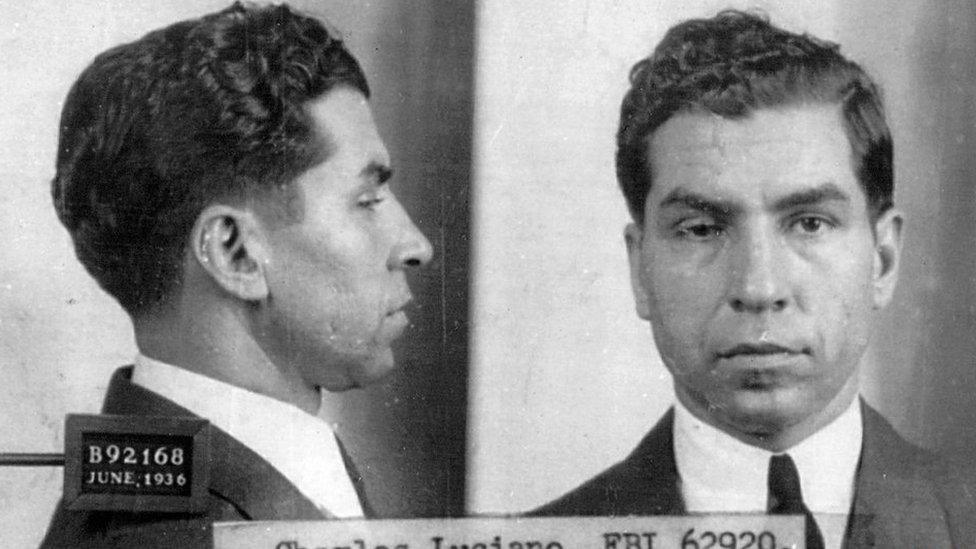
Charles "Lucky" Luciano an Italian mobster deported from the US sought sanctuary in Cuba during the 1950s
After all, in the years before Fidel Castro overthrew the government of military strongman Fulgencio Batista, the island had a reputation for being a playground of the rich and famous.
The American mafia families had a tight control of the economy and were granted special gambling and liquor licensing privileges by a corrupt government.
But few expect Havana would ever slide back to the mobster days of Meyer Lansky and Charles "Lucky" Luciano.
"Casinos will not come back," says Mr Magnan with finality. Such gambling centres have been banned.
"But what I do see happening is an influx of investment."
'Havana moment'
It seems raising money - and with it, the involvement of celebrities - is not necessarily the issue when it comes to Cuba.
Instead, the obstacles to genuine collaboration in the arts are questions for diplomats rather than Hollywood agents.
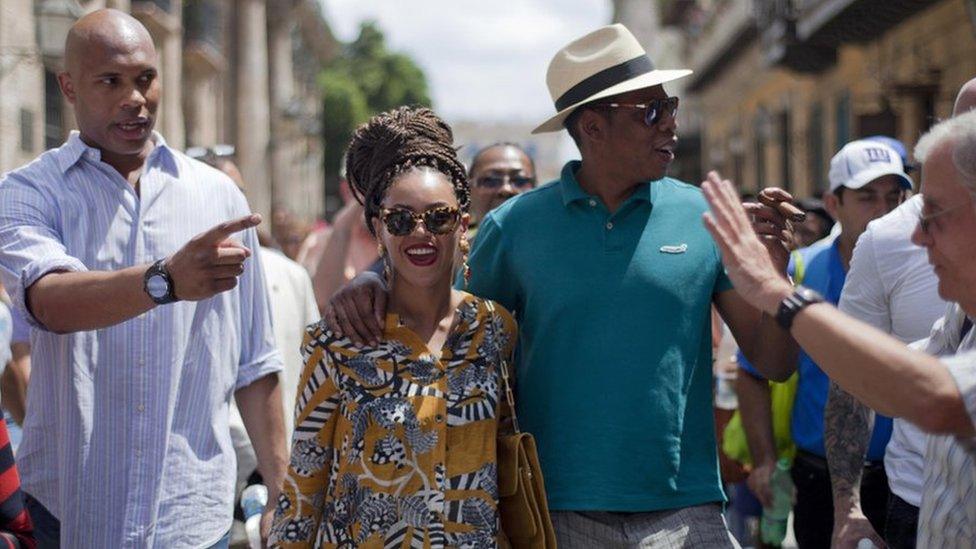
Beyonce and Jay Z's visit to Havana in 2013 got the pair into hot water with the US authorities
"The Cubans have never had a problem with welcoming Francis Ford Coppola or Sidney Pollack or whoever," says Ms Bosch.
"The problem was always on the American side."
The stars that came during the Cold War always faced undue pressure back home - and potential investigations into their financial dealings.
Even Jay-Z and Beyonce's 2013 visit was investigated by the US Treasury Department before being declared legal.
For now, the "Havana Moment" shows no sign of slowing down.
Continuing cool
First, the Rolling Stones are due to play in Havana just days after President Obama leaves.
Then, designer Karl Lagerfeld will be bringing Chanel to the island to hold its first South American Fashion show in May, citing the influence of the "cultural richness and opening up of Cuba".
There is even the island's first electronic music festival, planned in the city of Santiago.
"'Cool', the word is 'cool'," says Ms Bosch.
"Havana is cool at the moment.
"But then again, it was cool in the 60s, it was cool in the 40s."
"Havana has always been cool."